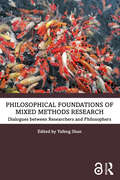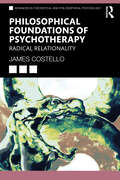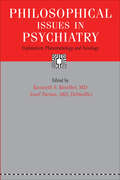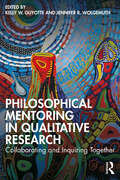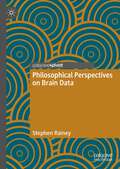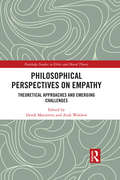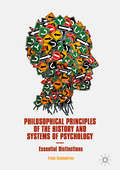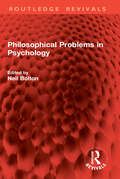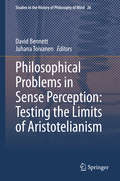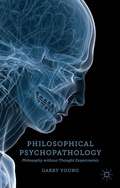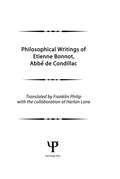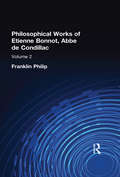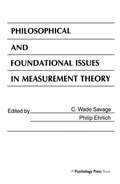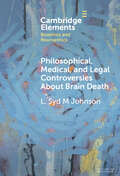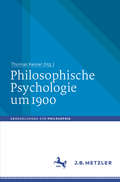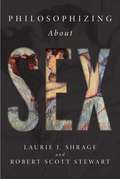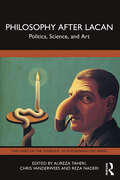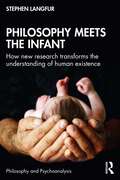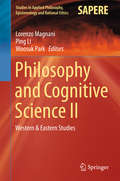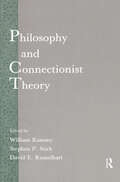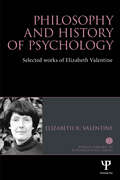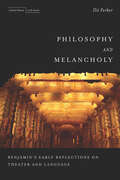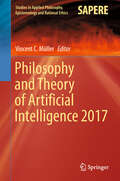- Table View
- List View
Philosophical Foundations of Mixed Methods Research: Dialogues between Researchers and Philosophers
by Yafeng ShanPhilosophical Foundations of Mixed Methods Research provides a comprehensive examination of the philosophical foundations of mixed methods research. It offers new defences of the seven main approaches to mixed methods (the pragmatist approach, the transformative approach, the indigenous approach, the dialectical approach, the dialectical pluralist approach, the performative approach, and the realist approach) written by leading mixed methods researchers. Each approach is accompanied by critical reflections chapter from philosophers’ point of view. The book shows the value of the use of mixed methods from a philosophical point of view and offers a systematic and critical examination of these positions and approaches from a philosophical point of view. The volume also offers a platform to promote a dialogue between mixed methods researchers and philosophers of science and provides foundations for further research and teaching of this hotly debated topic. This volume is ideal for researchers and advanced students, and anyone who is interested in research methods and the social sciences more generally.
Philosophical Foundations of Psychotherapy: Radical Relationality (Advances in Theoretical and Philosophical Psychology)
by James CostelloPhilosophical Foundations of Psychotherapy promotes a critical understanding of the ideas, traditions, values, and principles that inform and shape – for better or for worse – what therapists do.The book challenges the unhelpful misconception that philosophy is for philosophers alone, because human reality is too complex for therapists to be unaware of the foundations, difficulties, and contradictions within our value systems, ethics, and assumptions. By retrieving attitudes from other times and other places, traversing the relational contours of history right up to contemporary thinkers and practitioners, the author argues that not only do relationships heal, but they offer the only safe harbour in life’s sea of troubles. He promotes a conscientious radical relationality, which remains attentive to its influences, including contemporary debates about our neoliberal selves, the superstructures of culture, and the ethics of authenticity. In stepping back from the sometimes- narrow concerns of our therapeutic methods, the book explores broader themes important for living well: what is the good of therapy, how do we reconcile our sense of futility in the face of an indifferent universe, postcolonial debates, responses to disembodied artificial intelligence, and alternatives to our human- centred stance towards Nature.This book is primarily for practitioners, trainees, and educators, but ultimately it is intended for the greater good of clients and those interested in what therapeutic practices and practitioners have to offer. It will also be useful for those teaching research methods, the practice of research supervision, reflexivity, and personal development, across all areas related to mental health.
Philosophical Issues in Psychiatry: Explanation, Phenomenology, and Nosology (International Perspectives In Philosophy And Psychiatry Ser.)
by Kenneth S. Kendler Josef Parnas, M.D., Dr.Med.Sci.This multidisciplinary collection explores three key concepts underpinning psychiatry—explanation, phenomenology, and nosology—and their continuing relevance in an age of neuroimaging and genetic analysis.An introduction by Kenneth S. Kendler lays out the philosophical grounding of psychiatric practice. The first section addresses the concept of explanation, from the difficulties in describing complex behavior to the categorization of psychological and biological causality. In the second section, contributors discuss experience, including the complex and vexing issue of how self-agency and free will affect mental health. The third and final section examines the organizational difficulties in psychiatric nosology and the instability of the existing diagnostic system. Each chapter has both an introduction by the editors and a concluding comment by another of the book’s contributors.Contributors: John Campbell, Ph.D.; Thomas Fuchs, M.D., Ph.D.; Shaun Gallagher, Ph.D.; Kenneth S. Kendler, M.D.; Sandra D. Mitchell, Ph.D.; Dominic P. Murphy, Ph.D.; Josef Parnas, M.D., Dr.Med.Sci.; Louis A. Sass, Ph.D.; Kenneth F. Schaffner, M.D., Ph.D.; James F. Woodward, Ph.D.; Peter Zachar, Ph.D.
Philosophical Mentoring in Qualitative Research: Collaborating and Inquiring Together
by Kelly W. Guyotte Jennifer R. WolgemuthWith contributions from advanced, early career, and emerging qualitative scholars, Philosophical Mentoring in Qualitative Research illuminates how qualitative research mentoring practices, relationships, and possibilities of inquiry and teaching come to life under different mentoring philosophies. What we can know in and about the world is inseparable from our approach(es) to knowing with and in it. And how we mentor in qualitative research matters to what we can know and do as qualitative inquirers. Yet, despite its importance, mentoring is rarely conceptualized as a practice inspiring or inspired by philosophy. This edited book opens a needed space for thinking about mentoring as a philosophical practice. Its thoughtful chapters and artful "mentoring moments" draw on critical, feminist, new materialist, post-structuralist, and other philosophies to make visible, interrupt, reflect, deepen, and expand mentoring practices within the qualitative community revealing what we can know, do, and become through them. Philosophical Mentoring in Qualitative Research sensitizes readers to mentoring as a philosophical practice. As such, it is essential reading for students and researchers in qualitative research and higher education interested in mentoring practice and humanistic research values.
Philosophical Perspectives on Brain Data
by Stephen RaineyWhere there is data there are questions of ownership, leaks, and worries about misuse. When what’s at stake is data on our brains, the stakes are high. This book brings together philosophical analysis and neuroscientific insights to develop an account of ‘brain data’: what it is, how it is used, and how we ought to take care of it. Emerging trends in neuroscience appear to make mental activity legible, through sophisticated processing of signals recorded from the brain. This can include Artificial Intelligence (AI), with algorithms classifying brain signals for further processing. These developments will have ramifications for concepts of the brain, the self, and the mind. They will also affect clinical practices like psychiatry, by modifying concepts of mental health and introducing AI-based diagnostic and treatment strategies. The issues arising are vastly complicated, little understood, but of high importance. Philosophical Perspectives on Brain Data clarifies complex intersections of philosophical and neuroscientific interest, presenting an account of brain data that is comprehensible. This account can be the basis for evaluating practices based on brain data. As such, the book aims to open a novel space for evaluating hitherto arcane areas of academic research in order to provide the necessary scope for understanding their real-world consequences. These consequences will include personal, socio-political, and public health dimensions. It is therefore vital that they are understood if their impacts upon aspects of everyday life can be evaluated adequately.
Philosophical Perspectives on Empathy: Theoretical Approaches and Emerging Challenges (Routledge Studies in Ethics and Moral Theory)
by Anik Waldow Derek MatraversEmpathy—our capacity to cognitively or affectively connect with other people’s thoughts and feelings—is a concept whose definition and meaning varies widely within philosophy and other disciplines. Philosophical Perspectives on Empathy advances research on the nature and function of empathy by exploring and challenging different theoretical approaches to this phenomenon. The first section of the book explores empathy as a historiographical method, presenting a number of rich and interesting arguments that have influenced the debate from the Nineteenth Century to the present day. The next group of essays broadly accepts the centrality of perspective-taking in empathy. Here the authors attempt to refine and improve this particular conception of empathy by clarifying the intentionality of the perspective taker’s emotion, the perspective taker’s meta-cognitive capacities, and the nature of central imagining itself. Finally, the concluding section argues for the re-evaluation, or even rejection, of empathy. These essays advance alternative theories that are relevant to current debates, such as narrative engagement and competence, attunement or the sharing of mental states, and the "second-person" model of empathy. This book features a wide range of perspectives on empathy written by experts across several different areas of philosophy. It will be of interest to researchers and upper-level students working on the philosophy of emotions across ethics, philosophy of mind, philosophy of psychology, and the history of philosophy.
Philosophical Principles of the History and Systems of Psychology: Essential Distinctions
by Frank ScalambrinoTaking philosophical principles as a point of departure, this book provides essential distinctions for thinking through the history and systems of Western psychology. The book is concisely designed to help readers navigate through the length and complexity found in history of psychology textbooks. From Plato to beyond Post-Modernism, the author examines the choices and commitments made by theorists and practitioners of psychology and discusses the philosophical thinking from which they stem. What kind of science is psychology? Is structure, function, or methodology foremost in determining psychology's subject matter? Psychology, as the behaviorist views it, is not the same as the psychoanalyst's view of it, or the existentialist's, so how may contemporary psychology philosophically-sustain both pluralism and incommensurability? This book will be of great value to students and scholars of the history of psychology.
Philosophical Problems in Psychology (Routledge Revivals)
by Neil BoltonPhilosophical psychology reflects upon the aims and the concepts of empirical psychology. First published in 1979, Philosophical Problems in Psychology argues that empirical psychology must be founded upon the language of rationality, for actions and the reasons people give for their actions are at the heart of human behaviour.This thesis is defended in the contributions to Part I which assert that psychology must take the form of an elaboration of common sense. But the authors in Part II maintain that psychology may remain faithful to this insight whilst still developing more sophisticated models of behaviour. The use of computer models, Piaget’s views on the effects of internalization and a discussion of the geometry of phenomenal space provide illustrations. Part III contains three papers which explore the limitations of theoretical statements which emphasize our construction of reality. The pertinence of the computer analogy is disputed, subject-centred models are scrutinized in the light of phenomenology, and the role of theory in psychotherapy is critically discussed.
Philosophical Problems in Sense Perception: Testing the Limits of Aristotelianism (Studies in the History of Philosophy of Mind #26)
by David Bennett Juhana ToivanenThis volume focuses on philosophical problems concerning sense perception in the history of philosophy. It consists of thirteen essays that analyse the philosophical tradition originating in Aristotle’s writings. Each essay tackles a particular problem that tests the limits of Aristotle’s theory of perception and develops it in new directions. The problems discussed range from simultaneous perception to causality in perception, from the representational nature of sense-objects to the role of conscious attention, and from the physical/mental divide to perception as quasi-rational judgement. The volume gives an equal footing to Greek, Arabic, and Latin philosophical traditions. It makes a substantial contribution not just to the study of the Aristotelian analysis of sense perception, but to its reception in the commentary tradition and beyond. Thus, the papers address developments in Alexander of Aphrodisias, Themistius, Avicenna, John of Jandun, Nicole Oresme, and Sayf al-Din al-Amidi, among others. The result of this is a coherent collection that attacks a well-defined topic from a wide range of perspectives and across philosophical traditions.
Philosophical Psychopathology
by Garry YoungThis book uses rare pathologies to inform questions on topics such as consciousness and rationality. Rather than trying to answer these by inventing far-fetched scenario or 'thought experiments', it is better to utilize a rich but under-used clinical resource.
Philosophical Works of Etienne Bonnot, Abbe De Condillac: Volume 1
by F. Philip H. LaneThis highly readable translation of the major works of the 18th- century philosopher Etienne Bonnot, Abbe de Condillac, a disciple of Locke and a contemporary of Rousseau, Voltaire, and Diderot, shows his influence on psychiatric diagnosis as well as on the education of the deaf, the retarded, and the preschool child. Published two hundred years after Condillac's death, this translation contains treatises which were, until now, virtually unavailable in English: A Treatise on Systems, A Treatise of the Sensations, Logic.
Philosophical Works of Etienne Bonnot, Abbe De Condillac: Volume II
by Franklin PhilipThis is the first English translation of Condillac's most influential works: the Essay on the Origins of Human Knowledge (1746) and Course for Study of Instruction of the Prince of Parma (1772). The Essays lay the foundation for Condillac's theory of mind. He argues that all mental operations are, in fact, sensory processes and nothing more. An outgrowth of Locke's empirical account of ideas and sensations as a source of knowledge, Condillac's theory goes beyond Locke's foundations, introducing his universal method for understanding any complex entity: the reduction of all matters to their origins and then to their simplest forms. The Course, originally written to teach Prince Ferdinand of Parma to think and to develop good habits of mind following the principle of association of ideas, covers grammar, writing, reasoning, thinking, and ancient and modern history. Philip writes in the introduction: "[the] mind is moldable to reason and to 'nature' which gave it a model and provides the ultimate authority for all it can know or do."
Philosophical and Foundational Issues in Measurement Theory
by C. Wade Savage Philip EhrlichMeasurement theory has only recently become recognized as a legitimate, specialized field of inquiry. This text covers a wide range of issues of central concern to contemporary measurement theorists, and a broad range of philosophical perspectives are represented. The formalist, representationalist approach defines measurement as the assignment of numbers to entities and events to represent their properties and relations. It also states that measurement theory is supposed to analyze the concept of a scale of measurement, describe various types of scales and their uses, and formulate the conditions required for the existence of scales of various types. Since this approach dominates contemporary measurement theory, the volume begins with essays by some of its leading architects. In order to allow for diverse points of view, the book also includes articles that attempt to broaden this approach, and several that even criticize the approach.
Philosophical, Medical, and Legal Controversies About Brain Death (Elements in Bioethics and Neuroethics)
by L. Syd JohnsonThis Element considers current legal, ethical, metaphysical, and medical controversies concerning brain death. It examines the implicit metaphysical and moral commitments and dualism implied by neurological criteria for death. When these commitments and worldview are not shared by patients and surrogates, they give rise to distrust in healthcare providers and systems, and to injustice, particularly when medicolegal definitions of death are coercively imposed on those who reject them. Ethical obligations to respect persons and patient autonomy, promote patient-centered care, foster and maintain trust, and respond to the demands of justice provide compelling ethical reasons for recognizing reasonable objections. Each section illustrates how seemingly academic debates about brain death have real, on-the-ground implications for patients and their families.
Philosophie der Führung
by Dieter Frey Lisa Katharin SchmalzriedFührungskräfte arbeiten heute in einem unsicheren Umfeld mit wachsenden Anforderungen und immer variableren Rahmenbedingungen. Dennoch müssen sie Sicherheit ausstrahlen und ihren Mitarbeitern eine Orientierung bieten. Viele Führungskräfte empfinden dies als belastend und suchen nach einer Art Kompass, an dem sie ihr Handeln ausrichten können, nach dauerhaften Prinzipien für eine "gute Führung". Dieses Buch bietet einen solchen Kompass und leitet dazu "neue" Erkenntnisse aus uralten Theorien ab: Hätten Sie gedacht, dass die großen Philosophen von Kant über Rousseau bis Popper Anregungen für Ihr tägliches Führungshandeln bereit halten? - Wie Sie nach Ansicht Aristoteles als Chef ein gutes Vorbild werden? Wie Sie laut Hobbes mit egoistischen Mitarbeitern umgehen können? Wie nach Popper ein kritischer Dialog zu besseren Entscheidungen führen kann? Den Autoren dieses Buches gelingt es, in übersichtlichen Kapiteln verständlich und knapp die Grundlagen einer Theorie zu erklären, praktische Hinweise für eine moderne Führungskraft abzuleiten und schließlich ein verständliches Modell einer ethikorientierten Führung zu formulieren. - Kernthese: Gute Führung, die sich moralischen Werten verpflichtet sieht, ist auch eine erfolgreiche Führung! Und ganz nebenbei liest sich das Buch als eine unterhaltsame Einführung in die großen philosophischen Theorien. Für alle, die mit Aufgaben der Menschenführung betraut sind, ob in sozialen und kommerziellen Organisationen, im Bildungsbereich oder der Kindererziehung.
Philosophische Psychologie um 1900 (Abhandlungen zur Philosophie)
by Thomas KesselDieser Band stellt die eigentümlichen Mischungsverhältnisse natur- und geisteswissenschaftlicher Perspektiven im Feld der philosophischen Psychologien um 1900 ins Zentrum. Diese Konzeptionen, die den engen Rahmen des Psychologismus-Streites überschreiten und ihn gleichwohl kontextualisieren, werden durch Beiträge zu Franz Brentano, Wilhelm Dilthey, Carl Stumpf, Theodor Lipps, Wilhelm Wundt, Oswald Külpe, Edmund Husserl, Wilhelm Windelband, Paul Natorp und Nicolai Hartmann repräsentiert.
Philosophizing About Sex
by Laurie J. Shrage Robert Scott StewartAncient Greek philosophers, medieval theologians, Enlightenment thinkers, and contemporary humanists alike have debated all aspects of human sexuality, including its purpose, permissibility, normalcy, and risks. Philosophizing About Sex provides a philosophical guide to those longstanding and important debates. Each chapter takes a general issue (freedom, privacy, objectification, etc.) and shows how ongoing public discussions of sexuality can be illuminated by careful philosophical investigation. Debates over topics such as sexual assault, sexual orientation, sex education, prostitution, and “sexting” involve larger questions about morality, law, science, and politics and cannot be intelligently discussed in isolation from broader issues. By asking deceptively simple questions, this book shows how difficult but important it is to arrive at satisfying answers.
Philosophy After Lacan: Politics, Science, and Art (The Lines of the Symbolic in Psychoanalysis Series)
by Alireza Taheri Chris Vanderwees Reza NaderiPhilosophy After Lacan: Politics, Science, and Art brings together reflections on contemporary philosophy inspired by and in dialogue with Lacanian theory.Rather than focus on the thinkers who came before Lacan, the editors maintain attention on innovations in contemporary philosophy that owe their emergence to complimentary, critical, direct, or tangential engagement with Lacan. This collection makes one of the first concerted efforts to expand discussions between psychoanalysis and more recent philosophical thinkers while gathering chapters by some of the leading philosophical voices of the present moment. With contributors from around the world, this book has international appeal and is unique in its emphasis on contemporary philosophies inspired or influenced by Lacan.Philosophy After Lacan will not only appeal to psychotherapists and psychoanalysts, but also to students and professors of philosophy, critical theory, psychology, politics, history, and literature.
Philosophy Meets the Infant: How New Research Transforms the Understanding of Human Existence (Philosophy and Psychoanalysis)
by Stephen LangfurInfancy research and philosophy explore “first things,” yet few books bring the two fields into contact. Stephen Langfur’s Philosophy Meets the Infant integrates groundbreaking infancy studies of the last 50 years to offer a fresh exploration of our drive for human connection. He begins with a new understanding of self-awareness, which he locates in reciprocal attention between baby and caregiver. Instead of “I think, therefore I am,” the new research supports “You attend, therefore I am.” The event of becoming self-aware through another is termed a “You-I Event.”The idea is counterintuitive: we are perfectly self-aware when alone! To explain the change after infancy, Langfur makes transformative use of an old psychoanalytic finding. With the onset of language, a child internalizes (introjects) the most important You’s, playing them toward herself in speech. Instead of the original You-I Event, we have its counterfeit in our heads. Nevertheless, a longing for the true Event persists in the unconscious; individual chapters trace this longing in work, love, art, conversation, and religion.Organized into three parts (“The You-I Event in infancy and why it disappears," "The You-I Event after infancy," and "Philosophical Issues"), this book will be of keen interest to philosophers, infancy researchers, and anyone seeking new light on the major questions of human existence.
Philosophy and Cognitive Science II
by Ping Li Lorenzo Magnani Woosuk ParkThe book shows how eastern and western perspectives and conceptions can be used to addresses recent topics laying at the crossroad between philosophy and cognitive science. It reports on new points of view and conceptions discussed during the International Conference on Philosophy and Cognitive Science (PCS2013), held at the Sun Yat-sen University, in Guangzhou, China, and the 2013 Workshop on Abductive Visual Cognition, which took place at KAIST, in Deajeon, South Korea. The book emphasizes an ever-growing cultural exchange between academics and intellectuals coming from different fields. It juxtaposes research works investigating new facets on key issues between philosophy and cognitive science, such as the role of models and causal representations in science; the status of theoretical concepts and quantum principles; abductive cognition, vision, and visualization in science from an eco-cognitive perspective. Further topics are: ignorance immunization in reasoning; moral cognition, violence, and epistemology; and models and biomorphism. The book, which presents a unique and timely account of the current state-of-the art on various aspects in philosophy and cognitive science, is expected to inspire philosophers, cognitive scientists and social scientists, and to generate fruitful exchanges and collaboration among them.
Philosophy and Connectionist Theory (Developments in Connectionist Theory Series)
by William Ramsey Stephen P. Stich David E. RumelhartThe philosophy of cognitive science has recently become one of the most exciting and fastest growing domains of philosophical inquiry and analysis. Until the early 1980s, nearly all of the models developed treated cognitive processes -- like problem solving, language comprehension, memory, and higher visual processing -- as rule-governed symbol manipulation. However, this situation has changed dramatically over the last half dozen years. In that period there has been an enormous shift of attention toward connectionist models of cognition that are inspired by the network-like architecture of the brain. Because of their unique architecture and style of processing, connectionist systems are generally regarded as radically different from the more traditional symbol manipulation models. This collection was designed to provide philosophers who have been working in the area of cognitive science with a forum for expressing their views on these recent developments. Because the symbol-manipulating paradigm has been so important to the work of contemporary philosophers, many have watched the emergence of connectionism with considerable interest. The contributors take very different stands toward connectionism, but all agree that the potential exists for a radical shift in the way many philosophers think of various aspects of cognition. Exploring this potential and other philosophical dimensions of connectionist research is the aim of this volume.
Philosophy and History of Psychology: Selected works of Elizabeth Valentine (World Library of Psychologists)
by Elizabeth R. ValentineIn the World Library of Psychologists series, international experts themselves present career-long collections of what they judge to be their finest pieces – extracts from books, key articles, salient research findings, and their major practical theoretical contributions. Elizabeth Valentine has an international reputation as an eminent scholar and pioneer in the field of philosophy and history of psychology. This selection brings together some of her best work over the last thirty years. A specially written introduction gives an overview of her career and contextualises the selection in relation to changes in the field during this time. The first section on ‘Philosophy’ covers work on different theoretical approaches to psychology, introspection and the study of consciousness, the mind-body problem, and different types of explanation in psychology including reductionism. The second section, ‘From Philosophy to History’, includes work on the philosophical psychologists G. F. Stout and James Sully, among others. The third section on ‘History’ covers Valentine’s more recent historical work on the development of psychology in London – both institutional and biographical – and includes accounts of both Bedford College and University College, and the role of pioneer women psychologists. The book enables the reader to trace developments in the philosophy and history of psychology over the last thirty years. It will appeal to anyone with interests in these areas as well as being an invaluable resource for graduate and advanced undergraduate courses in conceptual and historical issues.
Philosophy and Melancholy: Benjamin's Early Reflections on Theater and Language
by Ilit FerberThis book traces the concept of melancholy in Walter Benjamin's early writings. Rather than focusing on the overtly melancholic subject matter of Benjamin's work or the unhappy circumstances of his own fate, Ferber considers the concept's implications for his philosophy. Informed by Heidegger's discussion of moods and their importance for philosophical thought, she contends that a melancholic mood is the organizing principle or structure of Benjamin's early metaphysics and ontology. Her novel analysis of Benjamin's arguments about theater and language features a discussion of theTrauerspielbook that is amongst the first in English to scrutinize the baroque plays themselves. Philosophy and Melancholyalso contributes to the history of philosophy by establishing a strong relationship between Benjamin and other philosophers, including Leibniz, Kant, Husserl, and Heidegger.
Philosophy and Theory of Artificial Intelligence 2017 (Studies in Applied Philosophy, Epistemology and Rational Ethics #44)
by Vincent C. MüllerThis book reports on the results of the third edition of the premier conference in the field of philosophy of artificial intelligence, PT-AI 2017, held on November 4 - 5, 2017 at the University of Leeds, UK. It covers: advanced knowledge on key AI concepts, including complexity, computation, creativity, embodiment, representation and superintelligence; cutting-edge ethical issues, such as the AI impact on human dignity and society, responsibilities and rights of machines, as well as AI threats to humanity and AI safety; and cutting-edge developments in techniques to achieve AI, including machine learning, neural networks, dynamical systems. The book also discusses important applications of AI, including big data analytics, expert systems, cognitive architectures, and robotics. It offers a timely, yet very comprehensive snapshot of what is going on in the field of AI, especially at the interfaces between philosophy, cognitive science, ethics and computing.
Philosophy in Turbulent Times: Canguilhem, Sartre, Foucault, Althusser, Deleuze, Derrida
by Elisabeth RoudinescoFor Elisabeth Roudinesco, a historian of psychoanalysis and one of France's leading intellectuals, Canguilhem, Sartre, Foucault, Althusser, Deleuze, and Derrida represent a "great generation" of French philosophers who accomplished remarkable work and lived incredible lives. These troubled and innovative thinkers endured World War II and the cultural and political revolution of the 1960s, and their cultural horizon was dominated by Marxism and psychoanalysis, though they were by no means strict adherents to the doctrines of Marx and Freud. Roudinesco knew many of these intellectuals personally, and she weaves an account of their thought through lived experience and reminiscences. Canguilhem, for example, was a distinguished philosopher of science who had a great influence on Foucault's exploration of sanity and madness-themes Althusser lived in a notorious personal drama. And in dramatizing the life of Freud for the screen, Sartre fundamentally altered his own philosophical approach to psychoanalysis. Roudinesco launches a passionate defense of Canguilhem, Sartre, Foucault, Althusser, Deleuze, and Derrida against the "new philosophers" of the late 1970s and 1980s, who denounced the work-and sometimes the private lives-of this great generation. Roudinesco refutes attempts to tar them, as well as the Marxist and left-wing tradition in general, with the brush of Soviet-style communism. In Freudian theory and the philosophy of radical commitment, she sees a bulwark against the kind of manipulative, pill-prescribing, and normalizing psychology that aims to turn individuals into mindless consumers. Intense, clever, and persuasive, Philosophy in Turbulent Times captivates with the dynamism of French thought in the twentieth century.
